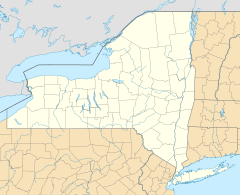Cohocton River facts for kids
Quick facts for kids Cohocton River |
|
|---|---|
|
Location of the mouth of the Cohocton River in New York State.
|
|
| Country | United States |
| State | New York |
| Region | Western New York |
| Physical characteristics | |
| Main source | Tabor Corners, Livingston County 42°39′26″N 77°31′56″W / 42.65722°N 77.53222°W |
| River mouth | Chemung River Painted Post, Steuben County 42°09′07″N 77°05′25″W / 42.15194°N 77.09028°W |
| Length | 58.5 mi (94.1 km) |
| Basin features | |
| Basin size | 474.3 sq mi (1,228 km2) |
The Cohocton River is a river in western New York State, United States. It is about 58.5-mile-long (94.1 km). The Cohocton River is a tributary of the Chemung River. This means it flows into the Chemung River.
The Chemung River then joins the Susquehanna River. All these rivers eventually flow into the Chesapeake Bay. The name "Cohocton" comes from an Iroquois word. It means "log floating in the water" or "trees in the water."
New York State Route 17 follows the river's path. This highway runs along the river for much of its journey. The Cohocton River is also a great spot for fly fishing.
River's Journey
The Cohocton River begins in southeastern Livingston County. This is near a place called Tabor Corners. It flows generally southeast through Steuben County. The river winds through a valley in the Allegheny Plateau.
It passes by towns like Cohocton, Avoca, and Bath. At Painted Post, the Cohocton River meets the Tioga River. When these two rivers join, they form the Chemung River.
River's Land Area
The Cohocton River has a large watershed. A watershed is all the land where water drains into a river. The Cohocton River's watershed covers about 474.3-square-mile (1,228 km2).
Most of this land is natural. About 61.9 percent is covered by forests. Another 35.8 percent is used for farming. Only a small part, about 1.5 percent, is urban areas like towns.
River History
In the 1820s, the New York State Legislature had an idea. They wanted to build a canal to connect the Cohocton River to other lakes. The plan was to link the river at Bath to Keuka Lake and Seneca Lake.
A canal called the Crooked Lake Canal was built. It connected Keuka Lake and Seneca Lake. However, the part that would connect to the Cohocton River was never finished.
 | Jackie Robinson |
 | Jack Johnson |
 | Althea Gibson |
 | Arthur Ashe |
 | Muhammad Ali |



